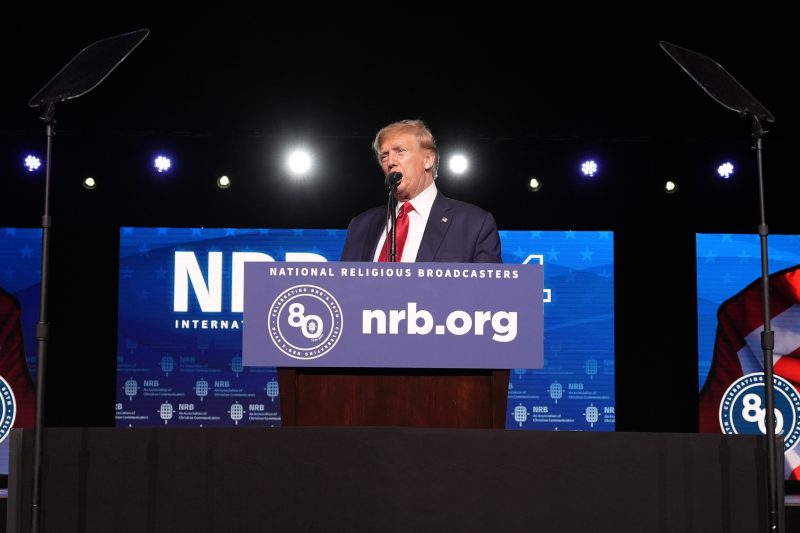Republican presidential front-runner Donald Trump further ratcheted up his inflammatory language against Americans who oppose him politically by likening them to the foreign enemies that the United States fought in World War II.
In a speech on Thursday to the National Religious Broadcasters in Nashville, the former president drew a direct connection between the battles during that organization’s founding in 1944 and his current campaign to win back the White House.
“Our country was at war with the enemy, and they wanted to extinguish our way of life forever,” Trump said. He added: “This time, the greatest threat is not from the outside of our country, I really believe this. It’s the people from within our country that are more dangerous. They’re very sick people.”
The audience cheered, and Trump went on to describe his cause as a holy war, adding: “To achieve victory in this fight, just like in the battles of the past, we still need the hand of our Lord.”
Trump has similarly railed against domestic enemies throughout the campaign, including in a speech on Veterans Day when he went so far as to compare his political opponents to “vermin” that he pledged to “root out” — terms that historians said echoed the propaganda of 20th-century dictators.
Trump has, on his own terms, promised to exercise power to deliver “retribution” and govern as a “dictator” on “day one” (sometimes claiming he was saying so in jest). In response to concerns about such pronouncements, Trump has started spinning accusations of undermining democracy back on his critics — a tactic that experts in political rhetoric say can be used to confuse or numb voters. On Thursday he called Biden’s actions “evil and a threat to democracy” and vowed to “reclaim our government from these tyrants.”
The former president faces 91 criminal charges, including some allegations centering on efforts to overturn the 2020 election. He repeated a pledge on Thursday to appoint a task force to review the cases of “every political prisoner” prosecuted by the Justice Department — a term that he has frequently used to describe defendants charged in the Jan. 6, 2021, riot at the U.S. Capitol.
Trump’s speech on Thursday was preceded by a recording of him reciting the Pledge of Allegiance mixed with a rendition of the national anthem by the “J6 Prison Choir,” purporting to be Jan. 6 defendants held in the Washington jail, including some of the most violent offenders convicted of assaulting police. During his remarks, Trump praised their “tremendous spirit” and called them “hostages.”
Trump is heavily favored in polls of Saturday’s primary in South Carolina, after winning handily in the first nominating contests. Tennessee’s Republicans vote on March 5, known as Super Tuesday for the multitude of states holding primaries that day. Trump’s campaign has projected that he could win enough pledged delegates to secure the Republican nomination by the end of March.
Trump on Thursday pledged to create a new federal task force against “anti-Christian bias” that would investigate “discrimination, harassment and persecution against Christians in America,” according to his prepared remarks. He said any Christian or person of faith who votes for a Democrat is “crazy.”
“You cannot let people vote for these people, you cannot let people vote for the Democrats,” he said.
Trump repeated a false claim that he removed federal restrictions on religious organizations or other nonprofits from endorsing political candidates. Trump said if reelected he would permanently eliminate the restrictions, known as the Johnson Amendment.
The former president also reprised his attacks on pro-Palestinian protesters, calling them “foreign jihadists.” He has previously said he would revoke student visas for protesters and reimpose a ban on travel from Muslim-majority countries.





























